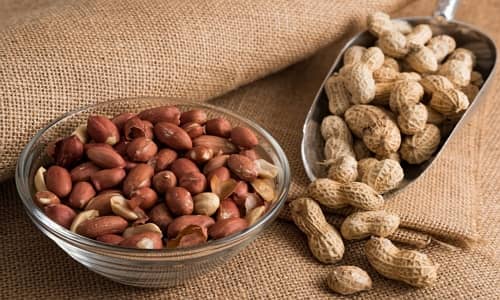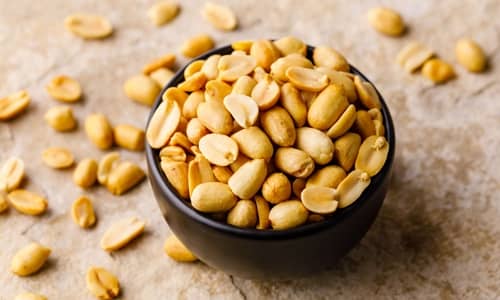Peanut Benefits, Calories, Side Effects
Peanut Nutrition

| Peanut (100g) Nutrition | |||
| Carbohydrate | Protein | Fat | Calories |
| 18g | 25g | 52g | 468kcal |
| Main Nutrition | Protein, vitamin B, vitamin E | ||
| Main Benefits | Blood sugar control and blood vessel health | ||
| Side Effects | Indigestion when excessive intake | ||
Peanuts come in many forms, including roasted, salted, chocolate-coated, and peanut butter. Peanuts have powerful nutritional properties. Peanuts are an excellent source of plant-based protein, fiber, and many key vitamins and minerals. In addition to their healthy nutritional profile, peanuts are a calorie-dense food and are best for your health when consumed in moderation.
2. Peanut Benefits

1. Improve blood sugar levels
Peanuts are a great food for people with diabetes or at risk for diabetes. Peanuts have a low glycemic index, so they don’t cause a significant rise in blood sugar levels. Peanuts are relatively low in carbohydrates but high in protein, fat and fiber, which help regulate blood sugar levels. Fiber slows down the digestive process to provide a steady release of energy, and proteins take longer to break down than simple carbohydrates. Eating peanuts may help people at high risk for obesity and type 2 diabetes manage their blood sugar levels.
2. Anticancer effect
Eating a lot of peanuts reduces the risk of various cancers, including colon cancer. Isoflavones, resveratrol, and phenolic acids found in peanuts have anticancer properties that may help reduce cancer risk. Additionally, the risk of cancer is reduced due to the protein and vitamin E present in peanuts.
3. Eye health
When it comes to maintaining eye health, some green leafy vegetables and peanuts are some of the best foods you can eat. The zinc in peanuts helps your body deliver vitamin A, which is needed for clear vision. Additionally, the vitamin E in peanuts helps slow age-related macular degeneration and cataract formation.
4. Heart Health
The high levels of monounsaturated and polyunsaturated fats in peanuts help keep your heart healthy. The oleic acid in peanuts also helps lower bad cholesterol, which in turn increases good cholesterol levels in the blood, and promotes a healthy blood lipid profile, which may help prevent coronary artery disease and stroke.
3. Peanut diet method
4. Peanut Side Effect
- Excessive consumption of peanuts may cause symptoms such as indigestion, abdominal pain, and diarrhea.
- Peanuts are high in calories, which can contribute to weight gain if consumed in excess.
- Peanuts must be stored with care as they can be infected with bacteria that produce aflatoxin, a carcinogen.
